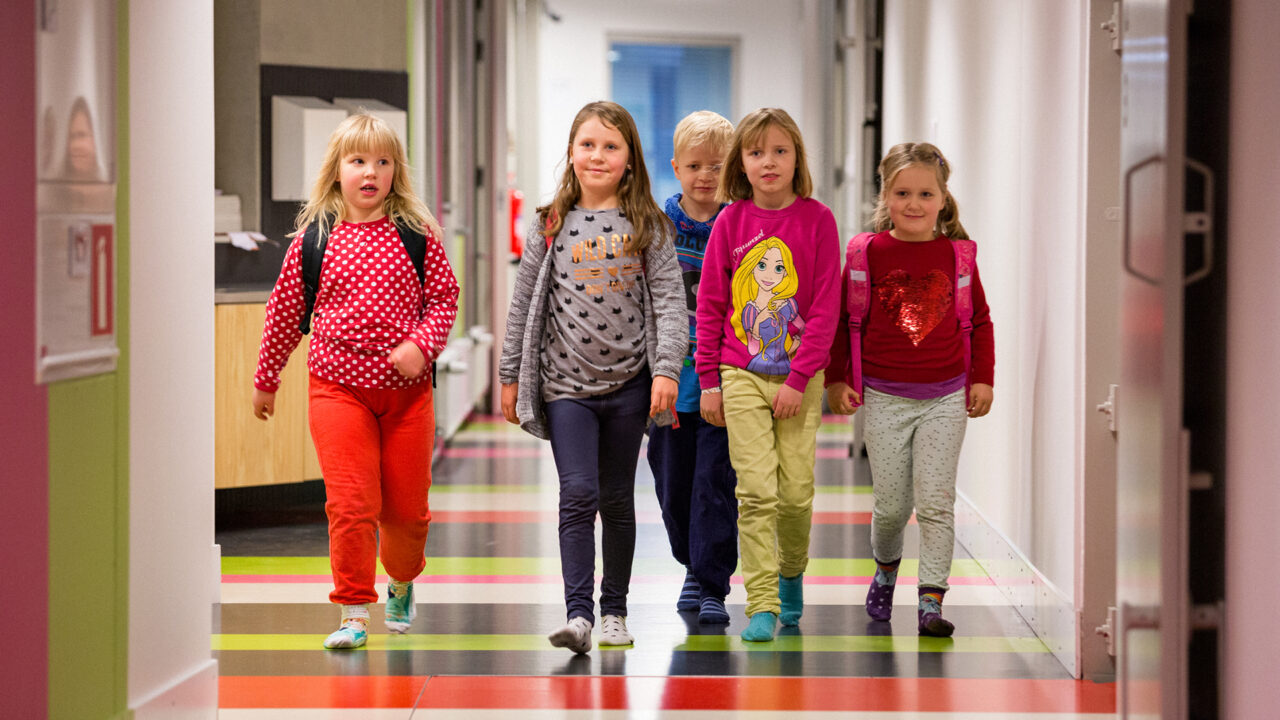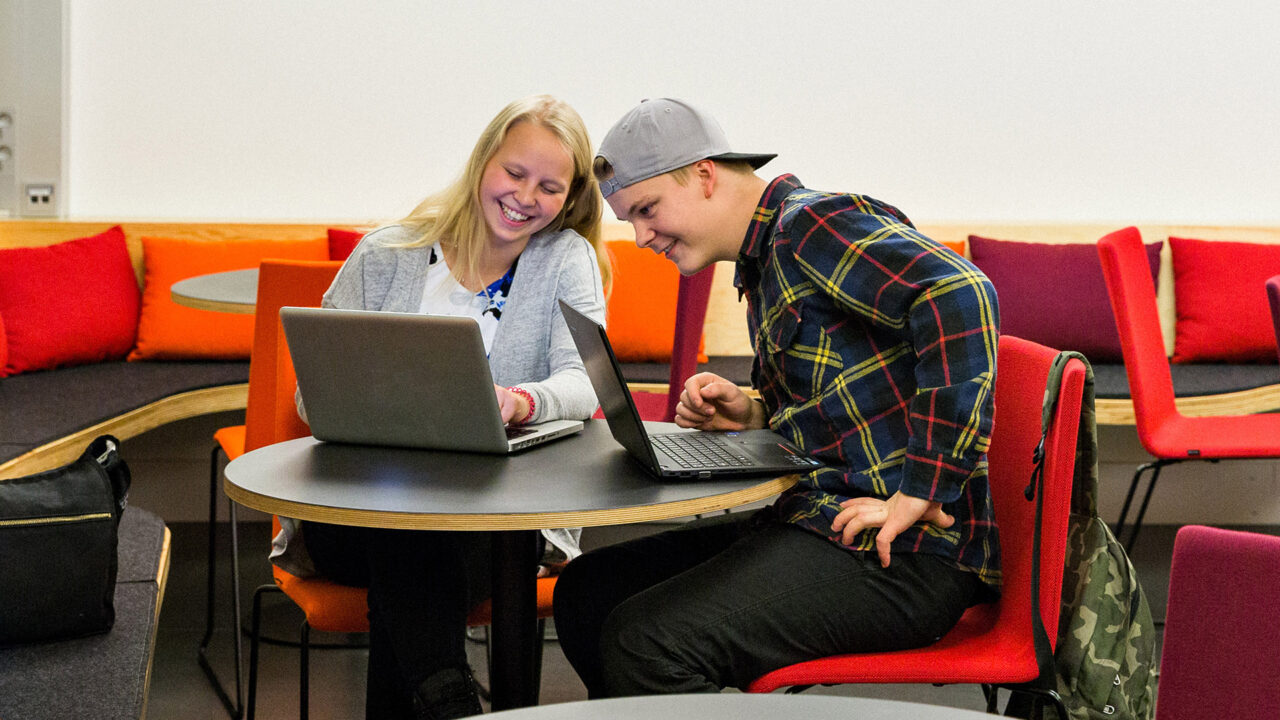We will bring Finland back to the top in education
Knowledge and skills ensure the success of our society. Equal and accessible high-quality education from early childhood to higher education is the key to future work, innovations and Finland's success in international competition. Education and training also create opportunities for everyone who lives in Finland irrespective of their background, place of residence or economic situation.
SDP’s education policy is based on a vision of the world’s most skilled nation. During the past parliamentary term, we have implemented its first, critical steps in order to restore the honour of skills and education. We have restored every child’s right to high-quality full-time early childhood education and care, extended compulsory education, and increased education funding. Next, we must concentrate on strengthening comprehensive school so that every child and young person genuinely does get an equal, high-quality education. Currently in comprehensive schools, the skills gaps between pupils have become wider and the influence of pupils’ background on learning outcomes has increased. In Finland, the connection of pupils’ socio-economic background with their learning outcomes has been among the weakest in the OECD countries but, in the latest study, it had reached the average level.
We will support everyone’s learning
Every child and young person has the right to get the support they need so that educational equality and every pupil’s equal opportunities are realised. We want to reform the learning support system to seamlessly cover the entire school pathway from early childhood education to higher education according to the pupil’s needs.
The three-level support for learning must be developed further. The different support levels and the resources they require must be clarified and teaching group sizes must be reviewed so that the number of pupils who need support is taken into account. The bureaucracy related to support for learning must be reduced. The conditions for support for learning must be safeguarded, starting from sufficient numbers of special education teachers, psychologists and school social workers, as well as funding.
In all education policy, more attention needs to be paid on the effects of gender, place of residence, and socio-economic background on the learning outcomes of children and young people. Weaker learning outcomes of boys are not a force of nature, and our schools must guarantee equal opportunities for everyone to do well at school.
Support and resources must be better channelled to support equal opportunities for all pupils. Sufficient support for a sufficient period should be offered in learning the national languages for pupils whose first language is not Finnish or Swedish so that the lack of language skills does not hinder learning.
We will invest in high-quality early childhood education and care
Every child has the right to a safe childhood. The right to high-quality early childhood education and care is part of a safe childhood. It is also part of growing up in a safe and reliable environment where the little ones learn to play together, form good relationships, and find their own ways of being part of a community. The care and education that children get in early childhood education support families significantly.
The backgrounds of children starting school are ever more varied. High-quality early childhood education and care evens out learning opportunities in school. However, by European comparison, enrolment in early childhood education and care in Finland is at a low level.
In other Nordic countries, the enrolment rate of the age groups of children over the age of 3 reaches the EU target enrolment rate of 96 but Finland’s rate is under 90 percent. SDP’s objective is to raise the Finnish early childhood education and care enrolment rate to the Nordic level. This can be reached by gradually moving towards free-of-charge early childhood education and care. As the first step, free-of-charge early childhood education and care must be extended to children over the age of 3, proceeding from older age groups toward younger ones.
High-quality early childhood education and care is every child’s educational basic right. It supports children’s equality in education and lifelong learning and effectively prevents inequalities between children. Key quality elements in early childhood education and care include staff education and skills, group size, and staff structure.

We will strengthen public early childhood education and care
In basic education, there have long been private schools. However, private schools are non-profit-making, as the Basic Education Act does not permit profit-seeking. SDP’s longer-term objective is to extend this prohibition of profit-seeking also to early childhood education and care.
Private early childhood education and care services must always operate according to the same quality criteria and same client fees as public services, and they are not allowed to pick children. Client diversity and every child’s equal right to early childhood education and care apply to all early childhood education and care implemented with public resources. Private early childhood education and care services should not be allowed to be organised for economic profit.
Comprehensive school is key
The Social democrats want to strengthen the original objective of comprehensive school. It must be possible to get high-quality teaching and learn basic skills in all schools across Finland. The work to improve the quality, equality, non-discrimination, and learning outcomes of basic education that was started during Sanna Marin’s term, must continue while strengthening the local school policy.
Strengthening basic skills must be at the heart of comprehensive school development. Based on PISA results, the learning outcomes of Finnish pupils have been declining throughout the 2000’s. Also COVID-19 has generated skills and wellbeing debt.
It must be possible to gain such a level of knowledge and skills in comprehensive school so that young people can manage in upper secondary education. Today, literacy and numeracy skills, as well as ICT skills, language skills, media literacy, democracy skills, and emotional competence are fundamental civic competences, the strengthening of which should be a key task for comprehensive school. They can help to strengthen educational equality and reduce inequalities. At the same time, we must invest in developing support for learning and strengthening preparatory education and educational pathways for learning Finnish or Swedish for immigrants.
In the coming parliamentary term, a comprehensive parliamentary reform of the Basic Education Act must be implemented and the national curriculum work must be updated as a continuation of the compulsory education reform.
Also clearer monitoring, steering and coordination of the equal and high-quality realisation of the rights of and services for children must be ensured. Both regional and school-specific differences in the quality and quantity of education already have too great of an effect on access to further studies and on learning outcomes. It is also important to make sure that the contents and structures of basic education correspond to the needs of the dramatically changing world of today and tomorrow.
We want to develop and reform comprehensive school to fix the recognised problems. The teaching staff should be strongly involved in the comprehensive school reform. The funding for basic education must be commensurate to the tasks assigned to municipalities.
Kaksivuotinen esikoulu vahvistaa koulutuksellista tasa-arvoa ja yhdenvertaisuutta sekä vaikuttaa lasten kehitys- ja oppimisedellytyksiin, sosiaalisiin taitoihin ja terveen itsetunnon muodostumiseen. SDP haluaa laajentaa esiopetuksen 5-vuotiaille käynnissä olevien kokeilujen mukaisesti.
Samalla parannetaan edellytyksiä järjestää esi- ja alkuopetusta kokonaisuutena, joka ottaa huomioon lapsen yksilöllisen kehityksen ja oppimisen valmiudet. Alkuopetuksella tarkoitetaan ensimmäisien kouluvuosien opetusta.

We will continue to develop upper secondary education
The extension of compulsory education has been a historic reform and, already within a short time, we have seen signs of school dropout rates decreasing. However, the reform is still in its early stage and the signs of the cutback policies of previous governments can still be seen. We want to strengthen the quality of upper secondary education by increasing support for students and developing the content of teaching. Cooperation among upper secondary education and basic education must be increased to ensure smooth transitions and improve basic skills.
The completion of upper secondary education is increased by guaranteeing sufficient and properly targeted resources for organising high-quality teaching. The compulsory education reform has increased the enrolment rate of upper secondary education and training. The next step is to ensure that everyone can complete an upper secondary qualification.
The high-quality and accessible organisation of general upper secondary education and vocational training requires increased cooperation. Educational cooperation and combining parts of different qualifications must be made easier. At the same time, it should be made sure that upper secondary education corresponds with regional labour needs and promotes a strong general education and skills level everywhere in Finland. In addition to the needs of the labour market, upper secondary education must also respond, in a broader sense, to the requirements of playing an active part in society. Media literacy, ICT skills, continuous learning, and inclusion in society are themes that upper secondary education must also address.

We will raise the education level of Finns
The role of higher education in raising the cultural level and as a source of economic growth is significant. However, the skill level of Finns has not increased over the last decades. At the same time, internationally, the number of those who have completed a higher education degree has risen, at its highest, to around 70 percent of young generations, and Finland has fallen clearly behind of the reference countries. SDP’s objective is to raise the skill level in Finland. We must set the ambitious goal of 60 percent of under 35-year-olds completing a higher education degree in the 2030’s, after which the education level should continue to rise.
The demand for highly qualified employees is growing strongly in the labour market, and we must be able to raise the education level of Finns. The demand is also intensified by the parliamentary commitment to increase RDI investments to 4 percent of GDP.
The number of international students will be at least tripled by 2030 and their employment opportunities in Finland will be improved. At the same time, cooperation between higher education institutions and employees should be increased so that as many people as possible can be employed in Finland. The teaching of Finnish and Swedish in English-language degree programmes should, then, also be improved.
We will improve teachers’ wellbeing and competence development
The foundation of skills rests on sufficient numbers of competent and contented teachers on all levels from early childhood education to higher education. Teachers’ working conditions and the attractiveness of the job must be improved. To improve attraction and retention, we need to ensure teachers’ wellbeing at work and skills maintenance, provide support in developing as a teacher, and streamline different qualification pathways. For its part, Finland can also be bigger than its size globally in teaching development.
SDP wants student intake in teacher training to be on an sufficient level to ensure high-quality teaching from early childhood education to higher education institutions. Also, swift pathways must be developed for teachers to acquire qualifications.
The high competence level of Finnish teachers is unique internationally. Still, the working conditions and attractiveness of the work of teachers and the entire school staff must be improved. All of those who work in schools must have real access to developing their skills during their career. This means not only the right to continuing education throughout the career, but also supporting the work of young teachers, in particular, for example through mentoring programmes.

We will invest in continuous development of skills
High skill and education levels are the best guarantee of citizens’ wellbeing and, at the same time, key factors in Finland’s success. There are fewer and fewer jobs that can be done relying on the comprehensive school syllabus. During Sanna Marin’s term, a parliamentary reform of continuous learning has been implemented to promote learning in working life, create a service system for continuous learning, and increase equity of participation by improving the accessibility of services. The system of continuous learning must be developed further to respond to the needs of the rapidly changing working life so that people can stay in the labour market. Also, the transition toward a digital society changes job descriptions and tasks rapidly. What is needed in this change is proactive skills development and a new kind of transition security. Particular attention should be paid to strengthening the basic skills of adults, but during their career, everyone should also have the opportunity for longer-term studies and on-the-job skills development.
SDP proposes a transition security programme that supports upskilling to a new field as a consequence of changes in the labour market. In particular, the demands of a just transition and the digital transformation must be met. Continuous learning and anticipating the upskilling needs are the best safety net in the global changes in work, technology and the world. The changes in the world of work are part of larger global phenomena, so it is worth taking advantage of internationally successful models in constructing the transition security model.
Studying while on unemployment security must be made easier. Adult student allowance is an important tool in reskilling, and it should support, in particular, the education and training of under-represented groups. It should be developed so that it truly enables new studies for people in different situations in life.
The role and responsibility of the employer in continuous learning in the workplace must be increased. Labour legislation and funding should be used as means to motivate organising tasks and work communities to support the development of skills. The aim is that the skills of employees improve and broaden on the job throughout their career.
During the next government term, a clear legislative framework must be created for continuous learning. The starting point must be the right to continuous learning, increasing educational equality, and sufficient resources for both the educational system and individuals to enable continuous learning. As a part of this new framework, there should be a new form of education: working life training. Working life training is short-term, non-degree training that is blended in its methods. The aim is to offer new skills to as many people as possible during their working lives and in different situations in life. These new skills should also be recognised as part of other competence and training.
We will improve students’ livelihood
Financial aid for students is developed, primarily, as part of other reforms of the social security system. SDP’s aim is to improve students’ livelihood and decrease the emphasis on student loan in the financial aid for students. During the coming term, the livelihood of students must be secured, in particular, by raising the level of the study grant and making annual index adjustments to it.
Methods of streamlining, from the students’ perspective, the collection of the healthcare fee for students in higher education will be established and implemented. The aim is that the fees should not have to be collected afterwards.